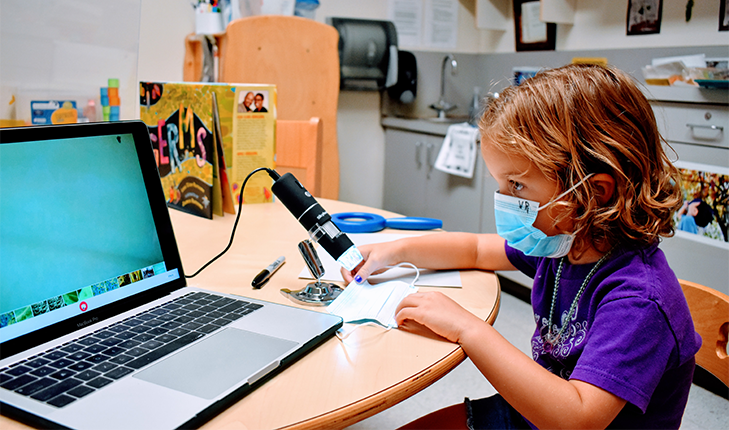Fansler Foundation awards Huggins Center $150,000
Research doesn’t show anyone how to prepare for a pandemic, let alone how to put a 3-year-old in front of a computer camera for weeks to learn.
But the Joyce M. Huggins Early Education Center within Fresno State’s Programs for Children was up to the task, having set the bar high for innovation and teacher training over the years thanks to the support of the Fansler Foundation.
After a four-month closure early in the pandemic, the Programs for Children reopened in August 2020 to provide the children of student-parents, faculty and staff with hybrid learning options: engaging and creative online interaction for those who chose to stay home, or onsite learning in a safe and sanitized environment.
The Huggins Center and the Fansler Foundation have long shared a mission to provide quality education to young children. The foundation, a private nonprofit in Fresno supporting organizations that assist challenged youth, has awarded grants to Programs for Children since 2003 to help with programming, professional development, the creation of an endowed chair and more. The foundation’s reach has also touched other areas of the University over the years.
In August, Fresno State received notification of a $150,000 gift from the Fansler Foundation to support the endowment for the D. Paul Fansler Endowed Chair for Leadership in Early Childhood Education and to continue the work of the Huggins Center.
Programs for Children provides services for about 155 children ages three months to 12 years through its three centers: the Campus Children’s Infant/Toddler Center, the Campus Children’s Preschool Center and the Huggins Center.
The Huggins Center includes the Marlene M. Fansler Infant and Toddler Program, the D. Paul Fansler Preschool and School Age Program, and the D. Paul Fansler Institute for the Leadership in Early Childhood Education. D. Paul Fansler was the nonprofit’s founder, who with his wife, Marlene, set out to help special needs and socioeconomically disadvantaged children in the Valley. He passed away in 1990, and his wife continues to lead the foundation.
“The Fansler Foundation shares our vision to provide the highest quality of service and priority for student families,” said Dr. Pei-Ying Wu, Fansler Chair and assistant professor in the Department of Literacy, Early, Bilingual and Special Education. The Fansler Chair was established in 2002 to expand opportunities for professional development and research.
“Many of our children are not from wealthy families. In the literature, children from those backgrounds don’t have resources to receive high-quality, advanced STEAM education,” Wu said. “With the Fansler Foundation’s generous support, we are able to provide that education to young children and their families. It means a lot to us that we have the Fansler Foundation who trusts us and are willing to give to us, share our positive outcomes and celebrate with us.”
The Huggins Center is inspired by the Italian “Reggio Emilia Education” approach based on the idea that children learn and express themselves in a variety of ways. Literacy development, critical thinking and creative expression are central to the curriculum. The Fansler Foundation believes in this approach and has helped the program send two teachers every year to Italy for training.
In recent years, Programs for Children started incorporating STEAM (science, technology, engineering, art and mathematics) into its teaching. That includes having equipment like light tables, microscope pens, a digital microscope, coding robots and coding blocks for the children while adapting online apps like Scratch Junior for early learners. The app is designed for children in kindergarten through sixth grade.
Teachers are trained to use the equipment and are adept at using online platforms like Google Suite, laptops and cameras to communicate. Their familiarity with using technology was beneficial this past year with virtual learning, said Brittney Randolph, director of Programs for Children. In addition, a virtual coaching team led by Wu was also able to observe the virtual classes and provide feedback on what could be improved, changed or tried.
There was a lot of experimenting on how to engage young learners on camera, Randolph said. Teachers assigned scavenger hunts around the house, had interactive reading with young children and did virtual collages with materials at home to keep 3-year-olds engaged online for two hours, she said.
Those who attended the program in person were welcomed back to classrooms with medical quality air purifiers and higher cleaning and sanitation standards than required by the Centers for Disease Control and Prevention. The campus custodial staff sprays and sanitizes classrooms and play structures, while the medical level air purifiers provide a little more protection, Wu said. All staff and children wore masks.
Program leaders plan to share its best practices and experiences from the past year. The centers have served as observation sites for about 200 community members in previous years, and more than 100 local educators have attended workshops hosted by the D. Paul Fansler Institute for the Leadership in Early Childhood Education.
“We are not hiding our secret, we are willing to share what we learned with local educators who may not have the resources we have,” Wu said. “We share our projects in the classroom, what we learn from our experience, how we teach young children who experience opportunity gaps, who are from marginalized backgrounds and diverse backgrounds. These practices are implementable anywhere.”





